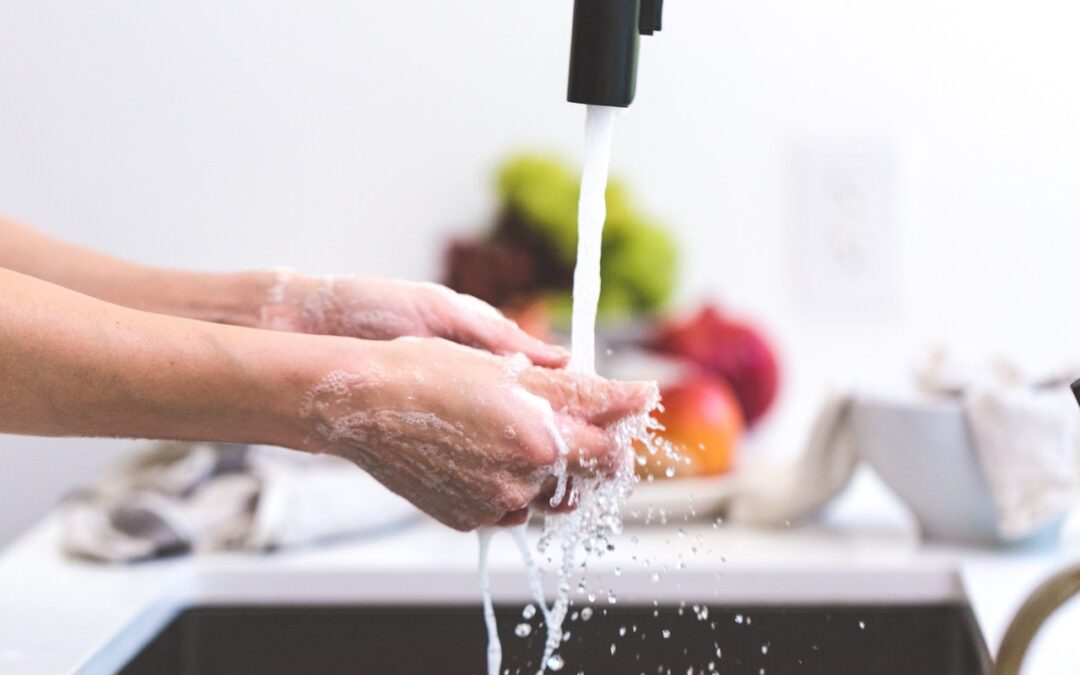Best Daily Practices:
–Wash your hands! This bears repeating since it is the most well-established way to ward off bacterial and viral infections. Be sure to wash your hands frequently and thoroughly with warm water and soap for at least 20 seconds. If soap and water is not available, hand sanitizer will also work. Ensure it contains at least 60% alcohol. Do your best to avoid hand sanitizer that contains Triclosan, as this chemical is known to disrupt our hormone balance.
–Cover your nose and mouth: When sneezing or coughing, cover your nose and mouth with the crook of your arm and sleeve (do not use your hand!)
–Avoid touching your face: If you have the virus on your fingers and then touch your eyes, nose, or mouth, the virus is now able to enter your body. Avoiding touching your face is tricky to do, but it is important to heed. If you have an itch, use your sleeve or your shoulder to scratch it.
–Clean high-touch surfaces: Disinfect surfaces that are frequently touched, such as doorknobs, keyboards, TV remotes, phones, and kitchen and bathroom counters. The virus can remain on surfaces for up to several days after an unwashed hand touches them.
If You Get Sick:
–Respiratory infection: If you develop an upper respiratory infection, aiming for over-the-counter medications will only abate your symptoms but without boosting your immune system. For immune-fighting modalities, focus on getting rest and drinking fluids. Good immune-boosting fluids would be, vegetable broth, bone broth, and herbal teas. Specific herbal teas to try include, ginger, peppermint, chamomile, eucalyptus, and hot water with lemon, honey, and cinnamon sprinkled in.
–Sore throat: If you feel a sore throat coming on, you’ll want to fend off any looming bacterial infection quickly. Although this isn’t the Corona virus, it still should be taken seriously since any illness will tax the immune system, making it difficult to fight off Corona virus germs. Taking slippery elm, whether in a hot tea or as a throat lozenge, is wonderful for easing sore throats. Sipping hot water with two tablespoons of honey will also be soothing and decrease inflammation in the throat. Lastly, herbal teas such as chamomile, peppermint, or those that contain marshmallow root or licorice root will all sooth and relieve pain from a sore throat.
–Sinus congestion: Decongestant remedies are found in a variety of essential oils such as, menthol, peppermint, eucalyptus, and frankincense. Find ways to use these oils in your vaporizer or steam inhaler. A neti pot or nasal irrigation bottle is another way to alleviate congestion. Buffered saline can be used in the neti pot to soothe irritated mucous membranes. Lastly, nasal sprays with xylitol will further soothe and moisturize nasal passages.
Supplements and Foods:
–Vitamin C: This might be a no-brainer, but vitamin C remains a top-player for it’s immune-boosting and antioxidant activities. It is key to fighting off bacterial and viral infections and can shorten the duration of colds.
–Vitamin D3: This mighty vitamin is notoriously low in most people, due to less time spent out in the sun coupled with a slow/poor ability to convert sunlight into active vitamin D. This nutrient also happens to be a very powerful supporter of the immune system as it reduces the risk of getting colds and the flu.
–Zinc: This mineral plays a vital role in strengthening the immune system (to the point that people created zinc lozenges as a cold remedy). It also helps reduce the number of times a person gets sick, as well as lessens the severity of cold symptoms.
–Selenium: Another important nutrient for our immune system, selenium is an antioxidant and strengthens our ability to fight bacteria, viruses, and even cancer cells! The easiest way to take Selenium is by eating two Brazil nuts per day. That was easy!
–Garlic: A compound, called allicin, is what makes garlic a powerful antimicrobial food. Garlic has been shown to reduce the severity of viral infections as well as upper respiratory infections. It can also help prevent the common cold virus from taking hold.
**Note that these suggestions, and others that are presented to you throughout the media and internet, are best practices for decreasing your risk of contracting bacterial and viral infections in general, as well as boosting the immune system overall. These are not proven practices against the COVID-19 virus specifically, as there is not yet a proven way to ward off the COVID-19 virus in particular.

